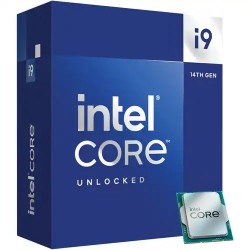02 Nov


Posted By
0 Comment(s)
3338 View(s)
Intel Core i9-14900K review: Too hot to handle
Although Intel's 14th Generation CPUs have just recently been released, they haven't been very good. Regretfully, the Core i9-14900K appears to be following the unfortunate pattern of the Core i5-14600K and Core i7-14700K, which were recently refreshed in every way. Even if the Core i7-14700K was difficult to cool and manage under load, you have to wait to see how terrible this Core i9 can go. Still, it's a fantastic CPU all by itself. The Intel Core i9-14900k is the high-end refresh of the older Raptor Lake process that intends to succeed the i9-13900k. This is just a refresh model, however, and the gains in performance aren't huge enough to warrant an upgrade.
Specifications
There isn't much of a difference between the Intel Core i9-14900K and the i9 from last year. Four additional E-cores and a slight increase in boost frequency are there, which is more than the other Raptor Lake Refresh processors have to offer. The manufacturing method remains Intel 7, and the cache remains unchanged.
i9-13900K | i9-14900K | |
Cores | 8 Performance + 16 Efficient | 6 Performance + 16 Efficient |
Base/Boost Freq (P-Cores) | 3GHz/5.6GHz | 3.2GHz/6GHz |
Base/Boost Freq (E-Cores) | 2.2GHz/4.2GHz | 2.4GHz/4.3GHz |
Cache | 36MB L3 + 32MB L2 | 36MB L3 + 32MB L2 |
Max TDP | 253W | 253W |
The Core i9-14900K doesn't actually differ all that much from the other processors, as the above table shows. The only noticeable difference is a tiny increase in the base and boost frequencies; otherwise, it has the same amount of P and E cores.
Power consumption and thermals
When the Intel Core i9-14900K was tested, its peak measured wattage was 256W, over 30W less than that of the Intel Core i7-14700K. This isn't because the i9 is a less power-hungry CPU; rather, it's because the chip heats up so quickly, it has to reduce power and performance before it reaches those high temperatures.
The chart above illustrates how rapidly it reaches that temperature, but as it needs to further control the thermal energy it produces, it gradually reduces its performance. Even though Cinebench R23 gives it a score of 32,518—an insanely high number—it's obvious that you'll need some rather strong cooling to subdue this beast. In our testing computer, it just does not drop below 30 degrees Celsius, not even when idling.
Our testing indicates that these results are lower than you would anticipate with improved cooling, but they are not entirely representative of total performance. Still, it appears to be nearly hard to cool this chip down sufficiently to keep it from throttling. I feel that this is more of an overclocked Raptor Lake CPU lineup than a true refresh based on my testing of the complete lineup.
Peak performance in sustained single-core loads
In single-core, the Intel Core i9-14900K peaks at 72 degrees Celsius with a maximum wattage of 92W. It scores 2,238 in single-core in Cinebench R23, which puts it around the typical results of the Core i9-13900K. There aren't really any other big improvements to be found here, and the results are akin to an overclocked 13th Gen i9.
You should buy the Intel Core i9-14900K if:
1. You need the best CPU no matter the cost
2. You have a perfect cooling system
3. You have the budget for a more powerful GPU to match
You shouldn't buy the Intel Core i9-14900K if:
1. You don't have adequate cooling or don't want to upgrade your cooling
2. You want a clear upgrade path in the future
3. You want more substantial upgrades
It's true that the Intel Core i9-14900K is one of the best CPUs available and a very powerful processor, but it doesn't make it a purchase worthwhile. It consumes a lot of power, runs quite hot, and will even get older faster than Tiles and the next generation. The greatest CPU available for the LGA 1700 socket is this one, but if you can't stand it at all, you'd be better off waiting for the more significant improvements that come along every year. To even operate this chip to its full potential, you'll need some substantial cooling, and we recommend at least a 360mm AIO. Even so, I would have my doubts.
Raptor Lake is a long way behind Meteor Lake. It uses new packaging technologies, an AI NPU engine, a smaller fabrication method for higher power efficiency and lower temperatures, and even little upgrades like Wi-Fi 7. While Raptor Lake Refresh allows users with 12th-generation CPUs to upgrade without having to replace their motherboard, Intel's Arrow Lake appears to be the next big step forward for desktop computers. Save your money, hold off till the next generation comes out, and purchase a new motherboard at the same time.

